25 start with O start with O
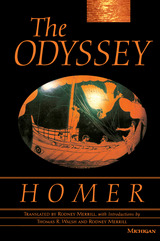
This epic began life as the music composed by a "singer of tales," not as words on a page. As such, its meter allows for pleasing variations with a strong basic "beat," thus providing a rhythmic impetus that carries the story swiftly forward. The resulting "music" has important repercussions for the reader's perception of the many repeated elements that provide structure for the poem and bring out significant themes, just as the repetitions in a piece of music do.
This edition of the Odyssey includes selections for further reading, a list of proper names (with a guide to pronunciation), and three maps. It also provides introductory discussions of how the work came into being and was transmitted until it became the work we read, how it is divided into six "performance sessions" of four books each, and how the poem's various themes are developed. Rodney Merrill's Odyssey is thus an ideal edition for students, teachers, and general readers.
The audiobook is available on twelve cassettes, and is read by Rodney Merrill. This version will bring Homer's epic masterpiece to life like never before. Perfect for the car or classroom!
Rodney Merrill is retired and an independent scholar. He has taught at Stanford University, the University of San Francisco, and the University of California, Berkeley.
Thomas R. Walsh, Senior Professor at Occidental College, has written articles on Homeric poetics, with a forthcoming book on anger in Homer.
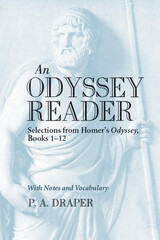
Homer's Odyssey has captivated readers and influenced writers and artists for more than 2,000 years. Reading the poem in its original language provides an experience as challenging as it is rewarding. Most students encountering Homeric Greek for the first time need considerable help, especially with vocabulary and constructions that differ from the more familiar Attic forms. For anyone who has completed studies in elementary Greek, this edition provides the assistance necessary to read, understand, and appreciate the first book of the Odyssey in its original language.
Structured to maximize reading ease, P. A. Draper's volume stands out among introductions to the Greek Odyssey. Readers of this edition will appreciate the positioning of all notes facing the Greek text; the frequent vocabulary entries; the complete glossary; the appendix on basic Homeric forms and grammar; and the copious annotations on vocabulary, grammar, meter, historical and mythological allusions, and literary interpretation.
Primarily designed as a textbook, this volume will be an effective classroom tool and a useful acquisition for any library supporting a classics program. The book will find readers among high school and college Greek students, advanced students in Homer or epic poetry classes, graduate students working on reading-list requirements, and anyone interested in maintaining Greek reading skills.
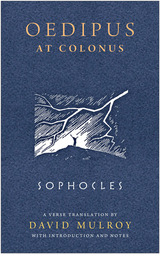
As in his previous translations of Oedipus Rex and Antigone, Mulroy combines scrupulous scholarship and textual accuracy with a fresh poetic style. He uses iambic pentameter for spoken passages and short rhymed stanzas for choral songs, resulting in a text that is accessible and fun to read and perform.
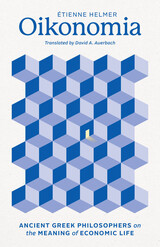
In this book, Étienne Helmer offers a comprehensive analysis of oikonomia in ancient Greek philosophy. Despite its similarity to the word “economy,” for the ancients, oikonomia named a branch of knowledge—the science of management—that was aimed at studying the practices we engage in to satisfy our needs. This began with the domestic sphere, but it radiated outward from the oikos (house) to encompass broader issues in the polis (city) as well. Helmer explores topics such as gender roles and marriage, property and the household, the acquisition and preservation of material goods, and how Greek philosophers addressed the issue of slavery in the ancient world. Even if we are not likely to share many of ancient thinkers’ beliefs today, Helmer shows that there was once a way of thinking of “economic life” that went beyond the mere accumulation of wealth, representing a key point of departure for understanding how to inhabit the world with others.
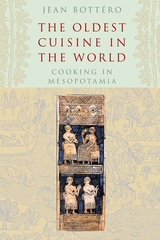
In this intriguing blend of the commonplace and the ancient, Jean Bottéro presents the first extensive look at the delectable secrets of Mesopotamia. Bottéro’s broad perspective takes us inside the religious rites, everyday rituals, attitudes and taboos, and even the detailed preparation techniques involving food and drink in Mesopotamian high culture during the second and third millennia BCE, as the Mesopotamians recorded them.
Offering everything from translated recipes for pigeon and gazelle stews, the contents of medicinal teas and broths, and the origins of ingredients native to the region, this book reveals the cuisine of one of history’s most fascinating societies. Links to the modern world, along with incredible recreations of a rich, ancient culture through its cuisine, make Bottéro’s guide an entertaining and mesmerizing read.

The preeminent lyric poet of ancient Greece.
Of the Greek lyric poets, Pindar (ca. 518–438 BC) was “by far the greatest for the magnificence of his inspiration” in Quintilian’s view; Horace judged him “sure to win Apollo’s laurels.” The esteem of the ancients may help explain why a good portion of his work was carefully preserved. Most of the Greek lyric poets come down to us only in bits and pieces, but nearly a quarter of Pindar’s poems survive complete. William H. Race now brings us, in two volumes, a new edition and translation of the four books of victory odes, along with surviving fragments of Pindar’s other poems.
Like Simonides and Bacchylides, Pindar wrote elaborate odes in honor of prize-winning athletes for public performance by singers, dancers, and musicians. His forty-five victory odes celebrate triumphs in athletic contests at the four great Panhellenic festivals: the Olympic, Pythian (at Delphi), Nemean, and Isthmian games. In these complex poems, Pindar commemorates the achievement of athletes and powerful rulers against the backdrop of divine favor, human failure, heroic legend, and the moral ideals of aristocratic Greek society. Readers have long savored them for their rich poetic language and imagery, moral maxims, and vivid portrayals of sacred myths.
Race provides brief introductions to each ode and full explanatory footnotes, offering the reader invaluable guidance to these often difficult poems. His Loeb Pindar also contains a helpfully annotated edition and translation of significant fragments, including hymns, paeans, dithyrambs, maiden songs, and dirges.

Late antique architecture.
Procopius, born at Caesarea in Palestine late in the fifth century, became a lawyer. In AD 527 he was made legal adviser and secretary of Belisarius, commander against the Persians, and went with Belisarius again in 533 against the Vandals and in 535 against the Ostrogoths. Sometime after 540 he returned to Constantinople. He may have been that Procopius who was prefect of Constantinople in 562, but the date of his death (after 558) is unknown.
Procopius’ History of the Wars in 8 books recounts the Persian Wars of emperors Justinus and Justinian down to 550 (2 books); the Vandalic War and after-events in Africa 532–546 (2 books); the Gothic War against the Ostrogoths in Sicily and Italy 536–552 (3 books); and a sketch of events to 554 (1 book). The whole consists largely of military history, with much information about peoples and places as well, and about special events. He was a diligent, careful, judicious narrator of facts and developments and shows good powers of description. He is just to the empire’s enemies and boldly criticizes emperor Justinian. Other works by Procopius are the Anecdota or Secret History—vehement attacks on Justinian, Theodora, and others; and the Buildings of Justinian (down to AD 558) including roads and bridges as well as churches, forts, hospitals, and so on in various parts of the empire.
The Loeb Classical Library edition of Procopius is in seven volumes.

Roman biographies of foreign commanders.
Cornelius Nepos was born in Cisalpine Gaul but lived in Rome and was a friend of Cicero, Atticus, and Catullus. Most of his writings, which included poems, moral examples from history, a chronological sketch of general history, a geographical work, Lives of Cato the Elder and Cicero, and other biographies, are lost. Extant is a portion of his De viris illustribus: (i) part of his parallel Lives of Roman and non-Roman famous men, namely the portion containing Lives of non-Roman generals (all Greeks except three) and a chapter on kings; and (ii) two Lives from the class of historians. The Lives are short popular biographies of various kinds, written in a usually plain readable style, of value today because of Nepos’ use of many good sources.

Antiquity’s most prolific and influential medical writer and practitioner.
Galen of Pergamum (129–?199/216), physician to the court of the emperor Marcus Aurelius, was a philosopher, scientist, medical historian, theoretician, and practitioner who wrote forcefully and prolifically on an astonishing range of subjects and whose impact on later eras rivaled that of Aristotle. Galen synthesized the entirety of Greek medicine as a basis for his own doctrines and practice, which comprehensively embraced theory, practical knowledge, experiment, logic, and a deep understanding of human life and society.
This volume presents three works of the greatest importance to Galen’s theory and practice of medicine. On Temperaments sets out Galen’s concept of the combination (krasis) of the four elemental qualities (hot, cold, wet, and dry), which is fundamental to his account of the structure and function of the human body and of animal and plant bodies generally, and is in turn essential to his theory of medical practice. The two related works, On Non-Uniform Distemperment and The Soul’s Traits Depend on Bodily Temperament, deal with specific aspects of dyskrasia, which is a disturbance in the combination of these qualities. Appended are two related short treatises, On the Best Constitution of Our Body and On Good Bodily State.

Antiquity’s most prolific and influential medical writer and practitioner.
If the work of Hippocrates is taken as representing the foundation upon which the edifice of historical Greek medicine was raised, then the work of Galen, who lived some six hundred years later, may be looked upon as the summit of the same edifice.
He was born in Pergamum AD 129, and both there and in other academic centers of the Aegean pursued his medical studies before being appointed physician to the Pergamene gladiators in 157. Becoming dissatisfied with this type of practice he emigrated to Rome, where he soon won acknowledgement as the foremost medical authority of his time and where, with one brief interruption, he remained until his death in 199.
Galen’s merit is to have crystallized or brought into focus all the best work of the Greek medical schools which had preceded his own time. It is essentially in the form of Galenism that Greek medicine was transmitted to after ages.

Meticulous eloquence.
Publius Aelius Aristides Theodorus was among the most celebrated, versatile, and influential authors of the Second Sophistic era and an important figure in the transmission of Hellenism. Born to wealthy landowners in Mysia in AD 117, he studied in Athens and Pergamum and had begun a promising oratorical career when in the early 140s he fell chronically ill and retreated to the healing shrine of Asclepius in Pergamum. There he began to follow a lifelong series of dream revelations and instructions from the god that inspired the six autobiographical books of Sacred Tales, an invaluable record of both temple therapy and personal religious experience published in the 170s. By 147 Aristides was able to resume his public activities as a member of the landed and gubernatorial elite and to pursue a successful oratorical career. Based at his family estate in Smyrna, he traveled between bouts of illness and produced speeches and lectures for both public and private occasions, declamations on historical themes, polemical works, prose hymns, and essays on a wide variety of subjects, all of it displaying deep and creative familiarity with the classical literary heritage. He died between 180 and 185.
This edition of Aristides’ complete works offers fresh translations and texts based on the critical editions of Lenz-Behr (Orations 1–16) and Keil (Orations 17–53). Volume I contains the Panathenaic Oration, a historical appreciation of classical Athens and Aristides’ most influential work, and A Reply to Plato, the first of three essays taking issue with the attack on orators and oratory delivered in Plato’s Gorgias.

The preeminent orator of ancient Athens.
Demosthenes (384–322 BC), orator at Athens, was a pleader in law courts who later became also a statesman, champion of the past greatness of his city and the present resistance of Greece to Philip of Macedon’s rise to supremacy. We possess by him political speeches and law-court speeches composed for parties in private cases and political cases. His early reputation as the best of Greek orators rests on his steadfastness of purpose, his sincerity, his clear and pungent argument, and his severe control of language. In his law cases he is the advocate, in his political speeches a castigator not of his opponents but of their politics. Demosthenes gives us vivid pictures of public and private life of his time.
The Loeb Classical Library edition of Demosthenes is in seven volumes.

Meticulous eloquence.
Publius Aelius Aristides Theodorus was among the most celebrated, versatile, and influential authors of the Second Sophistic era and an important figure in the transmission of Hellenism. Born to wealthy landowners in Mysia in AD 117, he studied in Athens and Pergamum and had begun a promising oratorical career when in the early 140s he fell chronically ill and retreated to the healing shrine of Asclepius in Pergamum. There he began to follow a lifelong series of dream revelations and instructions from the god that inspired the six autobiographical books of Sacred Tales, an invaluable record of both temple therapy and personal religious experience published in the 170s. By 147 Aristides was able to resume his public activities as a member of the landed and gubernatorial elite and to pursue a successful oratorical career. Based at his family estate in Smyrna, he traveled between bouts of illness and produced speeches and lectures for both public and private occasions, declamations on historical themes, polemical works, prose hymns, and essays on a wide variety of subjects, all of it displaying deep and creative familiarity with the classical literary heritage. He died between 180 and 185.
This edition of Aristides’ complete works offers fresh translations and texts based on the critical editions of Lenz-Behr (Orations 1–16) and Keil (Orations 17–53). Volume II contains Oration 3 (In Defense of the Four) and Oration 4, (A Reply to Capito), which along with Oration 2 take issue with the attack on orators and oratory delivered in Plato’s Gorgias.

The preeminent orator of ancient Athens.
Demosthenes (384–322 BC), orator at Athens, was a pleader in law courts who later became also a statesman, champion of the past greatness of his city and the present resistance of Greece to Philip of Macedon’s rise to supremacy. We possess by him political speeches and law-court speeches composed for parties in private cases and political cases. His early reputation as the best of Greek orators rests on his steadfastness of purpose, his sincerity, his clear and pungent argument, and his severe control of language. In his law cases he is the advocate, in his political speeches a castigator not of his opponents but of their politics. Demosthenes gives us vivid pictures of public and private life of his time.
The Loeb Classical Library edition of Demosthenes is in seven volumes.

The preeminent orator of ancient Athens.
Demosthenes (384–322 BC), orator at Athens, was a pleader in law courts who later became also a statesman, champion of the past greatness of his city and the present resistance of Greece to Philip of Macedon’s rise to supremacy. We possess by him political speeches and law-court speeches composed for parties in private cases and political cases. His early reputation as the best of Greek orators rests on his steadfastness of purpose, his sincerity, his clear and pungent argument, and his severe control of language. In his law cases he is the advocate, in his political speeches a castigator not of his opponents but of their politics. Demosthenes gives us vivid pictures of public and private life of his time.
The Loeb Classical Library edition of Demosthenes is in seven volumes.

The preeminent orator of ancient Athens.
Demosthenes (384–322 BC), orator at Athens, was a pleader in law courts who later became also a statesman, champion of the past greatness of his city and the present resistance of Greece to Philip of Macedon’s rise to supremacy. We possess by him political speeches and law-court speeches composed for parties in private cases and political cases. His early reputation as the best of Greek orators rests on his steadfastness of purpose, his sincerity, his clear and pungent argument, and his severe control of language. In his law cases he is the advocate, in his political speeches a castigator not of his opponents but of their politics. Demosthenes gives us vivid pictures of public and private life of his time.
The Loeb Classical Library edition of Demosthenes is in seven volumes.

The preeminent orator of ancient Athens.
Demosthenes (384–322 BC), orator at Athens, was a pleader in law courts who later became also a statesman, champion of the past greatness of his city and the present resistance of Greece to Philip of Macedon’s rise to supremacy. We possess by him political speeches and law-court speeches composed for parties in private cases and political cases. His early reputation as the best of Greek orators rests on his steadfastness of purpose, his sincerity, his clear and pungent argument, and his severe control of language. In his law cases he is the advocate, in his political speeches a castigator not of his opponents but of their politics. Demosthenes gives us vivid pictures of public and private life of his time.
The Loeb Classical Library edition of Demosthenes is in seven volumes.

The preeminent orator of ancient Athens.
Demosthenes (384–322 BC), orator at Athens, was a pleader in law courts who later became also a statesman, champion of the past greatness of his city and the present resistance of Greece to Philip of Macedon’s rise to supremacy. We possess by him political speeches and law-court speeches composed for parties in private cases and political cases. His early reputation as the best of Greek orators rests on his steadfastness of purpose, his sincerity, his clear and pungent argument, and his severe control of language. In his law cases he is the advocate, in his political speeches a castigator not of his opponents but of their politics. Demosthenes gives us vivid pictures of public and private life of his time.
The Loeb Classical Library edition of Demosthenes is in seven volumes.

The preeminent orator of ancient Athens.
Demosthenes (384–322 BC), orator at Athens, was a pleader in law courts who later became also a statesman, champion of the past greatness of his city and the present resistance of Greece to Philip of Macedon’s rise to supremacy. We possess by him political speeches and law-court speeches composed for parties in private cases and political cases. His early reputation as the best of Greek orators rests on his steadfastness of purpose, his sincerity, his clear and pungent argument, and his severe control of language. In his law cases he is the advocate, in his political speeches a castigator not of his opponents but of their politics. Demosthenes gives us vivid pictures of public and private life of his time.
The Loeb Classical Library edition of Demosthenes is in seven volumes.
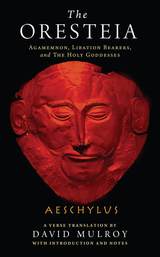
This drama of the House of Atreus catches everyone in a bloody net. Queen Clytaemestra of Argos murders her husband Agamemnon. Their son Orestes avenges his father by killing his mother. The Furies, hideous deities who punish the murder of blood kin, pursue Orestes. Into this horrific cycle steps Athena, goddess of wisdom, who establishes the rule of law to replace fatal vengeance. Orestes is tried in court before a jury of Athenians and found not guilty. Athena transforms the Furies into benevolent goddesses and extols the virtue of mercy.
An important historical document as well as gripping entertainment, the Oresteia conveys beliefs and values of the ancient Athenians as they established the world's first great democracy. Aeschylus (525/4–456/5 B.C.E.) was the first of the three great tragic dramatists of ancient Greece, forerunner of Sophocles and Euripides. In this trilogy he created a new dramatic form with characters and plot, infused with spellbinding emotion. David Mulroy's fluid, accessible English translation with its rhyming choral songs does full justice to the meaning and theatricality of the ancient Greek. In an introduction and appendixes, he provides cultural background for modern readers, actors, and students.
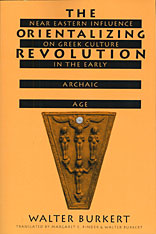
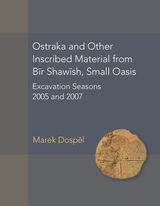
Informal documents and remains of material culture, when analyzed properly, offer a unique window into the daily lives and workings of ancient civilizations. Published here in their archaeological context and with any relevant artifacts, the documents and inscriptions excavated recently in Egypt’s Western Desert represent a valuable addition to our meager documentation of the Bahriya Oasis in the first centuries CE.
This is the first comprehensive treatment of an archaeological dataset from the archaeological exploration of Bīr Shawīsh. Dating to around 400 CE, these primary historical sources include documentary texts written on ostraka, informal inscriptions on various ceramic objects, plus a group of incised lids. The core of the volume consists of an annotated edition and analytical indices. This is prefaced by the historical and archaeological context and is followed by a synthesis of selected issues inherent to the published material. The book includes appendices and pictures of all published objects. Doubling the number of texts and inscriptions published to date from the Small Oasis, this new corpus furthers our understanding of the economic, administrative, and social history of Late Antique Egypt.

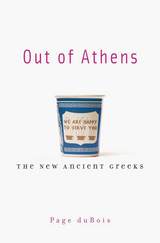

A suspicious mind.
Sextus Empiricus (ca. AD 160–210), exponent of scepticism and critic of the Dogmatists, was a Greek physician and philosopher, pupil and successor of the medical sceptic Herodotus (not the historian) of Tarsus. He probably lived for years in Rome and possibly also in Alexandria and Athens. His three surviving works are Outlines of Pyrrhonism (three books on the practical and ethical scepticism of Pyrrho of Elis, ca. 360–275 BC, as developed later, presenting also a case against the Dogmatists); Against the Dogmatists (five books dealing with the Logicians, the Physicists, and the Ethicists); and Against the Professors (six books: Grammarians, Rhetors, Geometers, Arithmeticians, Astrologers, and Musicians). These two latter works might be called a general criticism of professors of all arts and sciences. Sextus’ work is a valuable source for the history of thought especially because of his development and formulation of former sceptic doctrines.
The Loeb Classical Library edition of Sextus Empiricus is in four volumes.
READERS
Browse our collection.
PUBLISHERS
See BiblioVault's publisher services.
STUDENT SERVICES
Files for college accessibility offices.
UChicago Accessibility Resources
home | accessibility | search | about | contact us
BiblioVault ® 2001 - 2024
The University of Chicago Press









